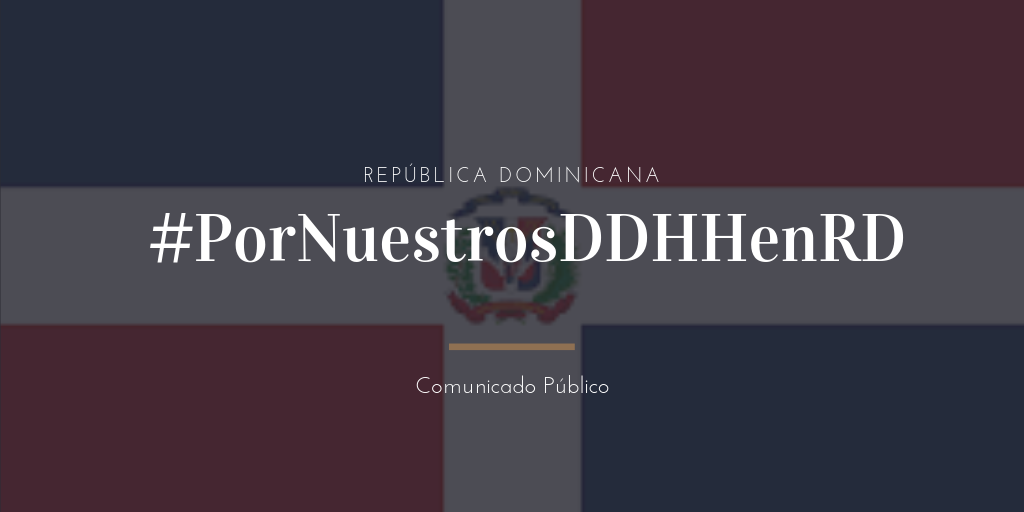HUMAN RIGHTS ORGANIZATIONS URGE THE DOMINICAN REPUBLIC TO RESPECT & PROTECT THE IASHR
Santo Domingo, Dominican Republic, May 29, 2019 – The undersigned organizations express our concern regarding the State’s rejection of the Inter-American Court of Human Rights’ recent resolution with respect to the Dominican Republic, in which the Court reiterated its jurisdiction to hear cases against that State. The Inter-American Court determined that the Dominican Constitutional Tribunal […]

Santo Domingo, Dominican Republic, May 29, 2019 – The undersigned organizations express our concern regarding the State’s rejection of the Inter-American Court of Human Rights’ recent resolution with respect to the Dominican Republic, in which the Court reiterated its jurisdiction to hear cases against that State. The Inter-American Court determined that the Dominican Constitutional Tribunal decision TC-256-14, which, according to the State, would prevent the Court from making any ruling concerning the country, is invalid under international law.
On April 26, the Dominican State affirmed in a press conference that it will continue not to recognize the jurisdiction of the Inter-American Court on the basis of the TC-256-14 decision, despite the Court’s recent resolution. The current president of the Dominican Constitutional Tribunal and the former president of the Republic, Leonel Fernández, have made similar statements. It bears noting that in 1999, President Fernández himself formally accepted the jurisdiction of the Inter-American Court of Human Rights on behalf of the Dominican State. In addition, while different political actors have spoken out against the Court’s resolution, prominent legal experts have supported its conclusion, asserting that the Inter-American Court maintains its jurisdiction and that, constitutionally, its decisions are as binding as those of the Constitutional Tribunal.
As human rights organizations, we are concerned about the position expressed by representatives of the Dominican State, as it forms part of an effort by the State to limit access to justice for all people living in the Dominican Republic. It is important to point out that there are currently more than 86 cases of human rights violations with respect to the Dominican Republic before the Inter-American Commission on Human Rights (IACHR), which deal with issues such as women’s rights, political participation, the rights of persons deprived of their liberty, due process, and the right to an effective remedy before the law, among others, which could eventually be decided by the Inter-American Court of Human Rights. Given the Dominican State’s position, these victims may see their possibilities of justice and reparation seriously affected.
Over the years, both the IACHR and the Inter-American Court have been essential pillars for the defense and protection of human rights throughout the continent, and have contributed significantly to the advancement of human rights in our countries. Thus, for example, the organs of the Inter-American human rights system (IAHRS) have developed international human rights standards in the fight against corruption in countries such as Guatemala and Honduras, which have contributed to initiatives such as the International Commission Against Impunity in Guatemala (CICIG) or the Mission to Support the Fight Against Corruption and Impunity in Honduras (MACCIH). Likewise, they have been fundamental in the defense and guarantee of the rights of diverse groups such as LGBTI persons, persons deprived of their liberty, Afro-descendants and indigenous people, children, adolescents, people with disabilities, human rights defenders, and migrants, among many others.
It should be noted that, beyond the great uncertainty for the victims who already have received judgments in their favor, the position of the Dominican State with respect to the competence of the Inter-American Court limits the possibilities of all persons residing in Dominican territory to obtain redress for violations of their human rights in the absence of a solution at the national level. For them, the IAHRS may be the last hope of finding justice, truth and redress.
For all the above reasons, the signatory organizations, all of which work in the defense of human rights, urge the Dominican Republic to recognize its international obligations, legal certainty, and avoid limiting the guarantees of protection.

